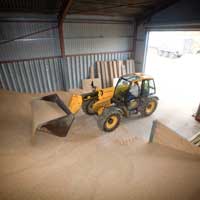Upbeat outlook for agricultural commodities

Agricultural commodity prices are expected to remain depressed for the near future, though the medium-term outlook – from 2011 onwards – is much more upbeat.
The latest World Agricultural Outlook report from the EU Commission says the continuing economic crisis “is likely to put a damper on commodity prices for the near future”.
“In the short term [until 2011] the effect of the crisis is bearish for all products, though in most cases prices will still be above the historical average for 1997-2006,” said an accompanying statement.
But agriculture is expected to cope better than other sectors with the economic crisis, due to the relatively low income elasticity of demand for food, it adds.
The report suggests that, once the recession ends, grain and oilseed demand will take off in Asia, Africa and the Middle East, driven by population growth, the expansion of livestock production and increased demand for biofuel feedstocks.
Quoting figures from the OECD (Organisation for Economic Cooperation and Development), it also points to a 50% increase in demand for butter and poultry in developing countries by 2018, and a 40% increase in demand for vegetable oil and whole milk powder.
“In the medium term all prices are expected to rise in line with the anticipated economic recovery, supported by higher oil prices,” it says. “Because crops have a significantly higher sensitivity to oil price changes than livestock, crop prices are expected to show a greater increase.”
The report suggests, across all sectors, average prices will be 15-60% above those of the last decade.
In a second report to be issued by the EU Commission this week, it emerges that the EU is facing a deteriorating balance of food trade, with imports outweighing exports by almost €5bn.
The analysis shows that most of this change was due to higher prices rather than higher volumes in 2008, though there was significant growth in imports of soya beans and soya meal for livestock feed, and palm oil and rapeseed for biodiesel.
Of some concern is the apparent effect of the recession, which has led to a decline in the value of EU food exports to the USA in particular.
This €1bn loss was countered by a €1bn gain in sales to Russia in 2008. But EU food exports to Russia have dropped by 24% in the first quarter of 2009, with pork, cheese and vegtables among the products most affected.
Overall, total EU food exports fell by 12% in the first three months of the year. The report points to decreasing prices and deteriorating exchange rates, as well as the drop in world demand for food, a shift away from higher value added products and a lack of finance for trade.
